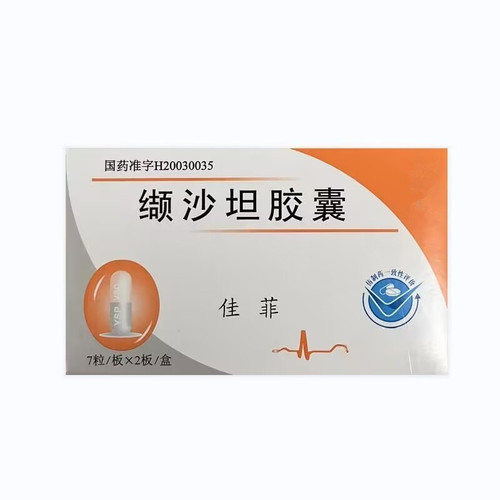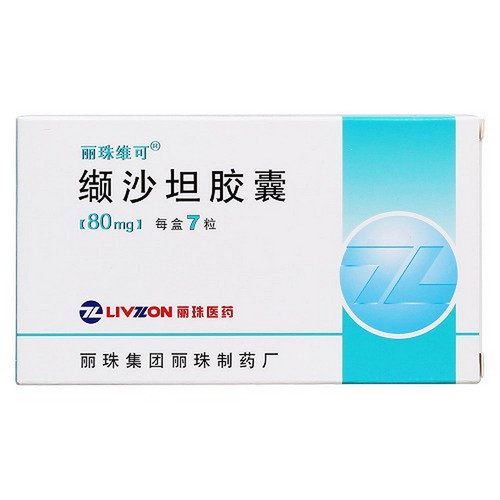Product Overview
[Drug Name]
Generic Name: Valsartan Capsules
Trade Name: Tuoping
English Name: Valsartan Capsules
Chinese Pinyin: Xiashatan Jiaonang
[Ingredients]
The main ingredient of this product is valsartan.
[Appearance]
Light gray cap, flesh-colored opaque capsule shell, white powder contents.
[Indications]
Treatment of mild to moderate essential hypertension.
[Dosage and Administration]
Recommended dose: Diovan 80 mg once daily. Dosage is independent of race, age, or gender and may be taken with or without food (see Absorption). It is recommended to take the drug at the same time each day (e.g., morning). A definitive antihypertensive effect is achieved within two weeks of treatment, and maximum efficacy is achieved after four weeks. If the antihypertensive effect is unsatisfactory, the daily dose can be increased to 160 mg, or a diuretic can be added. No dose adjustment is required for patients with renal insufficiency (contraindicated in severe renal failure) or non-biliary, non-choledostatic hepatic insufficiency. Diovan can be used in combination with other antihypertensive drugs.
[Adverse Reactions]
The overall incidence of adverse reactions with this drug is similar to that with placebo. The main adverse reactions observed in clinical use include headache, dizziness, viral infections, upper respiratory tract infections, cough, diarrhea, fatigue, rhinitis, back pain, nausea, pharyngitis, and arthralgia. The incidence of adverse reactions is not related to dose or duration of treatment, nor to gender, age, or race. It is unknown whether these reactions are causally related to treatment with this drug. Laboratory Indications: This drug may occasionally cause decreases in hemoglobin and hematocrit. In controlled clinical trials, 0.8% and 0.4% of patients taking this drug experienced significant decreases in hematocrit and hemoglobin, respectively, compared to 0.1% in the placebo group. Neutropenia occurred in 1.9% of patients taking this drug and 1.8% of patients taking ACE inhibitors. In controlled clinical trials, 0.8%, 4.4%, and 6% of patients taking this drug experienced significant increases in serum creatinine, serum potassium, and total bilirubin, respectively, compared to 1.6%, 6.4%, and 12.9% of patients taking ACE inhibitors, respectively. Patients taking this drug may occasionally experience elevated liver function tests. No specific laboratory parameters need to be monitored when using this drug in patients with essential hypertension.
[Contraindications]
Allergy to any component of this drug: Pregnancy: There is no experience with Diovan in patients with severe renal failure (creatinine clearance less than 10 ml/min).
[Precautions]
Hyponatremia and/or hypovolemia: In rare cases, patients with severe sodium and/or hypovolemia (e.g., those taking high-dose diuretics) may experience symptomatic hypotension when starting Diovan therapy. Correction of hyponatremia and/or hypovolemia, or reduction of the diuretic dose, should be performed before starting Diovan. If hypotension occurs, the patient should be placed supine and, if necessary, given intravenous saline. Diovan therapy should be resumed after blood pressure stabilizes. In 12 patients with secondary vascular hypertension due to unilateral renal artery stenosis, Diovan was administered for 4 days without significant changes in renal hemodynamics, creatinine, or blood urea nitrogen (BUN). Because other drugs that act on the RAAS may increase blood urea nitrogen (BUN) and creatinine levels in patients with unilateral or bilateral renal artery stenosis, monitoring is recommended to ensure safety. No dose adjustment is required for patients with renal impairment. No dose adjustment is required for patients with hepatic impairment. The valsartan dose should not exceed 80 mg/day in patients with mild to moderate hepatic impairment. Valsartan is primarily excreted unchanged in the bile, and excretion is reduced in patients with biliary obstruction. Valsartan should be used with caution in such patients. As with other antihypertensive drugs, patients taking this medication should exercise caution when driving or operating machinery.
[Special Use in Special
Populations] Precautions for Children:
The efficacy and safety of this drug in children and adolescents (under 18 years of age) have not been studied.
Precautions for Pregnancy and Lactation:
This drug is contraindicated in pregnant and lactating women.
Precautions for the Elderly:
Although systemic exposure to valsartan in the elderly is slightly higher than in younger adults, this is not clinically significant.
[Drug Interactions]
1. Clinical trials have not revealed any clinically significant interactions between this drug and the following drugs: cimetidine, warfarin, furosemide, digoxin, atenolol, indomethacin, hydrochlorothiazide, amlodipine, and glyburide.
2. This drug generally has no clinically significant interactions with metabolic inducers or inhibitors of the cytochrome P450 enzyme system.
3. In vitro studies have shown no plasma protein binding interactions with other drugs with high plasma protein binding, such as diclofenac, furosemide, and warfarin.
4. Concomitant use with potassium-sparing diuretics (e.g., spironolactone, triamterene, amiloride), potassium preparations, or potassium-containing salt substitutes may increase serum potassium. If coadministration is necessary, monitor carefully.
[Pharmacological Actions]
1. This product is an angiotensin II receptor antagonist. 2. This product selectively targets the AT1 receptor subtype known to be associated with the action of angiotensin II, selectively blocking the binding of angiotensin II to AT1 receptors on tissues such as the adrenal glands and vascular smooth muscle, inhibiting vasoconstriction and aldosterone secretion, resulting in a hypotensive effect. 3. This product has an affinity for AT1 receptors that is approximately 20,000 times higher than for AT2 receptors. This product does not affect the action of bradykinin or ion channel function, nor does it bind to the receptors of other hormones that play an important role in regulating cardiovascular function. 4. This product is non-carcinogenic, teratogenic, mutagenic, and reproductively toxic.
[Storage] Store tightly closed.
[Strength] 80mg
[Packaging Size] 80mg x 14s/box
[Expiry Life] 36 months
[Approval Number] National Medicine Standard H20030777
[Manufacturer] Tianda Pharmaceutical (Zhuhai) Co., Ltd.








